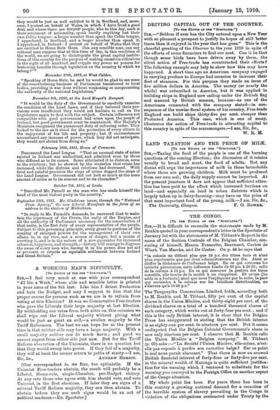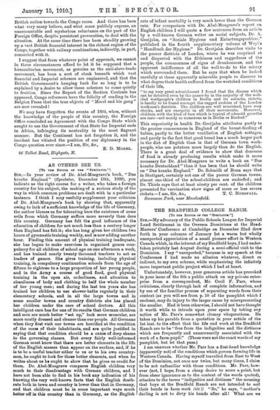THE CONGO.
To THE EDITOR or THE " SPECTATOZ.P1 SII2j-It is difficult to reconcile the statements made by M. Renkin quoted in your correspondent's letter in the Spectator of January 1st with the statements of M. Tibbaut's Report in the name of the Section Centrale of the Belgian Chamber, con- sisting of himself, Messrs. Francotte, Beernaert, Carton de Wiart, Van Marcke, and De Coster. On p. 44 he says that "la colonie ne &tient plus qua 19 p.c. des titres emis et n'eskt plus representee que par deux administrateurs sur dix. Ainsi so chiffre la, decheance de l'influence beige. En ce qui concerne les interets pecuniaires, cette influence tombe de 60 p.c. 1 2350 ; cells de la colonie 1 19 p.c. En ce qui concerne la gestion des biens concedes, elle tombs de in moitie 1 un cinquieme. Et meme {he adds in a footnote] ainsi quo nous l'expliquons par la suite, la part qui reviendra b. la colonic) sur les benefices distribuables, ne s'elevera 18.26 p.c."
The Tanganyika Concessions, Limited, holds, according both to M. Renkin and M. Tibbaut, fifty per cent. of the capital shares in the Union Miniere, and thirty-eight per cent. of the dividend shares on a total of a hundred thousand shares of
each category, which works out at forty-four per cent. ; and if this is the only British interest, it is clear that the Belgian
Press has exaggerated in stating that the British interest is as eighty-one per cent. to nineteen per cent. But it seems undisputed that the Belgian Colonial Government's share is now only nineteen per cent. I observe that M. Renkin calls the Union Miniere a " Belgian company." M. Tibbaut (p. 60) asks :—" La Societe l'Union Miniere, elle-meme, n'est- elle pas exposee a perdre son caractere beige? Sur ce point le mai nous parait alarmant." That there is now an avowed British financial interest of forty-four or forty-five per cent. in the mineral wealth of Katanga is quite sufficient justifica- tion for the warning which I ventured to substitute for the warning you conveyed to the Foreign Office on another aspect of the Congo situation.
My whole point lies here. For years there has been in this country a growing national demand for a cessation of the horrible system of slavery prevailing in the Congo in violation of the obligations contracted under Treaty by the British nation towards the Congo races. And there has been what very many believe, and what some publicly express, an unaccountable and mysterious reluctance on the part of the Foreigi Office, despite persistent provocation, to deal with the situation. At the same time there has been steadily growing np a vast British financial interest in the richest region of the Congo, together with railway combinations, indirectly, in part, connected with it.
I suggest that from whatever point of approach, we cannot in these circumstances afford to let it be supposed that a humanitarian movement, as genuine as the anti-slave-trade movement, has been a sort of cloak beneath which vast financial and Imperial schemes are engineered, and that the British Government's hanging back for so long is to be explained by a desire to allow these schemes to come quietly to fruition. Since the Report of the Section Centrale has appeared, Congo reformers have the felicity of reading in the Belgian Press that the true objects of "Morel and his gang" are now revealed !
We may have forgotten the events of 1894, when, without the knowledge of the people of this country, the Foreign Office concluded an Agreement with the Congo State which sought to use the Government of that State for Imperial ends in Africa, infringing its neutrality in the most flagrant manner. But the Continent has not forgotten it, and the incident has vitiated the position of our diplomacy in the Congo question ever since.—I am, Sir, &c.,







































 Previous page
Previous page